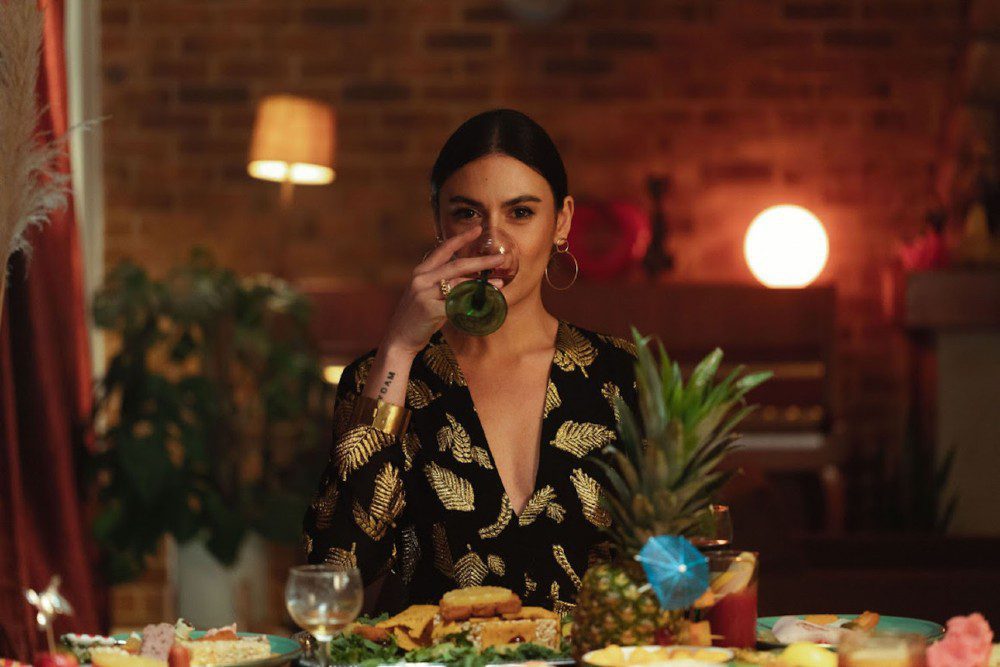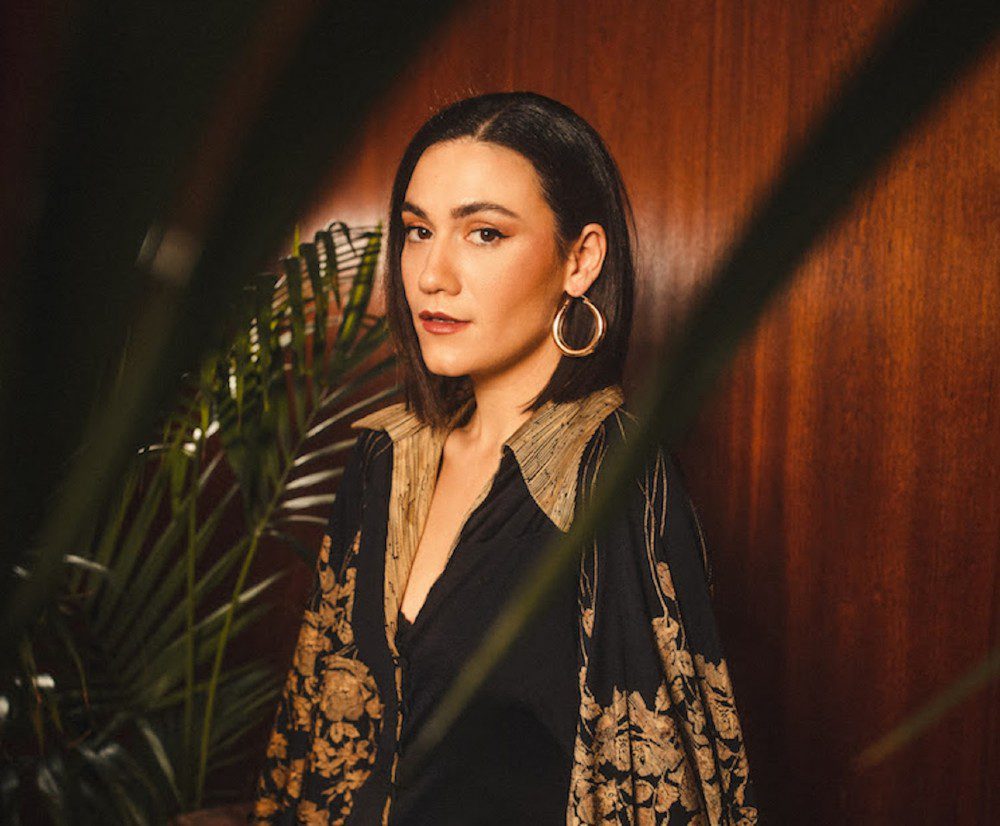

On her latest single “Trad,” Nadine Shah sings “Shave my legs/Freeze my eggs/Will you want me when I am old?” and it’s clear that Shah’s latest project tackles expectations put upon women and how women internalize that pressure. While writing her 2020 album Kitchen Sink, Shah sat down with close friends and asked them intimate questions about their lives, uncovering previously unspoken pain. She collected their stories along with her own—namely her battle with endometriosis—to make the record. Shah’s voice is commanding as ever, an obsidian blade slicing into layered, driving music and deceptively joyful horns.
Kitchen Sink arrived in June, but its promotion has been anything but normal, due to the pandemic as well as personal factors. Shah has just announced is that she’ll perform the album in its entirety at the Barbican on March 30, 2021, with limited in-person attendance (the show will also be available via livestream – tickets for both are available via the venue’s website). Her website has a few more tentatively scheduled live dates, too.
In her music, Shah has a way of tackling heavy themes without being preachy or self-pitying. She’s known for being a crusader for mental health awareness, among other causes. “My first album was about mental health. My second one was about tumultuous relationships and mental health. The third one’s about the refugee crisis in Syria,” Shah say by way of summarizing her albums, one of which (2018’s Holiday Destination) was nominated for the Mercury Prize.
For Shah, the reward is in the connections she makes with others. This was particularly true for Kitchen Sink.
“The most beautiful thing that came from writing this album was the conversation I had with my friends,” Shah asserts. “What surprised me the most was how many harrowing situations my very close friends have been in and not spoken to anyone about. It was only until I asked my friends if they’d ever been raped, and eight out of the ten said yes. I myself have been. But I didn’t realize I had been until I had these conversations with women. It’s terrifying.”
She wondered, at first, why close friends hadn’t shared their stories with her sooner. “These women had shame. They felt they brought it on for being drunk or too friendly. I said ‘No, no, no, no, my love. You did nothing wrong.’ I didn’t know about these dark stories that haunted them,” she says. “Now we have stronger relationships.”
One song on Kitchen Sink deals specifically with a friend’s experience. The refrain to “Buckfast” repeats “reciting all the times you kick yourself” before culminating with the line “I can’t wait till you’re sober,” which speaks to the lasting effects of trauma. The singer-songwriter remembered this friend going through a traumatic breakup, but she’d never known the full story. “When they broke up, people called her crazy. She wasn’t. She was completely bullied and manipulated and made to feel crazy,” Shah recounts. “She’s better now, and that song is her power. My friend feels empowered, which she should. She’s a fucking superstar, that lass.”
For Nadine Shah, speaking up about difficult issues has been lifelong. Born in the UK to a part-Norwegian mother and Muslim, Pakistani father, occasional culture clashes added to the usual childhood troubles. “I’d go to a school dance and my dad would say I couldn’t wear anything above the knee. My mom would say ‘Listen, wear this dress from Tommy Girl. When your dad’s around, put this coat on,’” Shah remembers. She also remembers that her mother, who passed this year, loved seeing a boldness and defiance in Shah that she never would have allowed herself otherwise.
“My mother always said I was her Tiger Daughter,” Shah fondly recalls. “She was quite a shy woman even though she was brave. She would never have been the kind of a person who’d get on a stage and speak out. But I knew she had this glint in her eye. A bit of her that she couldn’t release was in me. She couldn’t say it, but I could.”
Tiger or not, Shah finds herself often fearing cancel culture. “I don’t go on Twitter drunk anymore,” she laughs. She doesn’t feel alone in her fears either. “So many musicians are scared to speak what they want to say. We don’t get each other’s beautiful stories. We don’t get bombastic, crazy stories. Musicians are scared of a trial by social media,” she laments.
Fortunately, that doesn’t stop Shah from making gutsy music, sometimes with a hyperbolic twist. “Ladies for Babies (Goats for Love)” theorizes that men would rather reproduce with women but actually be in love with goats. In the vividly colored video, Shah helps her partner prepare for a big dinner party but clearly has moments of isolation, delivering the chorus from her bathroom. “She never could give you enough,” packs so much resonance into a matter-of-fact lyric.
For the artist herself, anxieties about women’s presumed motherhood center around painful endometriosis. “I wonder if I’ll be a worthwhile partner if I have a child. I have a beautiful partner and I feel like I’m a nightmare to live with because we can’t have sex. My period hurts so much,” she says, adding that she hopes this health issue is discussed more. Shah recounts a doctor who said she’d need a hysterectomy before even examining her. Frustrations with England’s health system led her to seek private care, for which she had to borrow money from her father. Despite having two surgeries, the pain and its subsequent anxieties have returned.
As outspoken as Shah is—even about her fear of being outspoken—she doesn’t want her messages to override her work as an artist. “I’m hardly ever asked about the process or technicalities behind the music,” she says, adding that she’s had to fight to negotiate future production credit. “Are people assuming that I don’t fucking make the music? I write the music. I write the music on piano. I write the music on guitar. I write the lyrics. I’m in the studio. I’m the second mixer. I’ve learned the mastering process.” She describes the writing process as “fucking boring” and talks animatedly about the fun of mixing an album with others, usually her co-producer Ben Hillier.

With Kitchen Sink out, Shah has been able to take on other projects and is currently scoring two movies. “I love it so much more because it’s not about myself and I’m not singing. I love playing piano,” she says, noting the piano-heavy score to forthcoming BBC podcast, Battersea Poltergeist, a collaboration with Hillier. “One thing I like about lockdown is that I can make piano music again. I really connected with that instrument again.”
Though Shah has dealt with a lot of anxiety about how her albums are received, she’s finally learning to relax and trust herself in all parts of the process. “The biggest difference is confidence in myself and in the kindness of others,” she affirms. “When people ask if I can do something, I just say yes and then learn how to do it.”
There’s that Tiger Daughter again. This nickname has accrued new significance for Shah, who lost her mother a few months ago. Along with her unspeakable grief, the singer-songwriter was surprised to feel something else: liberation. Not from her mother, but from having survived the loss. “Now I feel fearless. I’ve seen the worst thing in the world. I’ve lost my best friend, and I’ve experienced the biggest pain you can experience in your life. I’ve also been afforded the superpower to not give a shit. I was with her when she died. Now everything feels achievable. I’m not scared. I’m not anxious,” she says. “There is nothing in the world that scares me. That sounds mad, but it’s true. It’s really exciting to be an artist and know that nothing affects me. If anybody ever asks me about grief, I’ll say ‘You’ve got a superpower now. You’re fearless.’”
Listening to her music, hearing her experiences, it’s hard to believe Shah’s held back very much. Wherever the fearlessness takes her, it’s sure to be worth the ride.
Follow Nadine Shah on Facebook and Instagram for ongoing updates.

